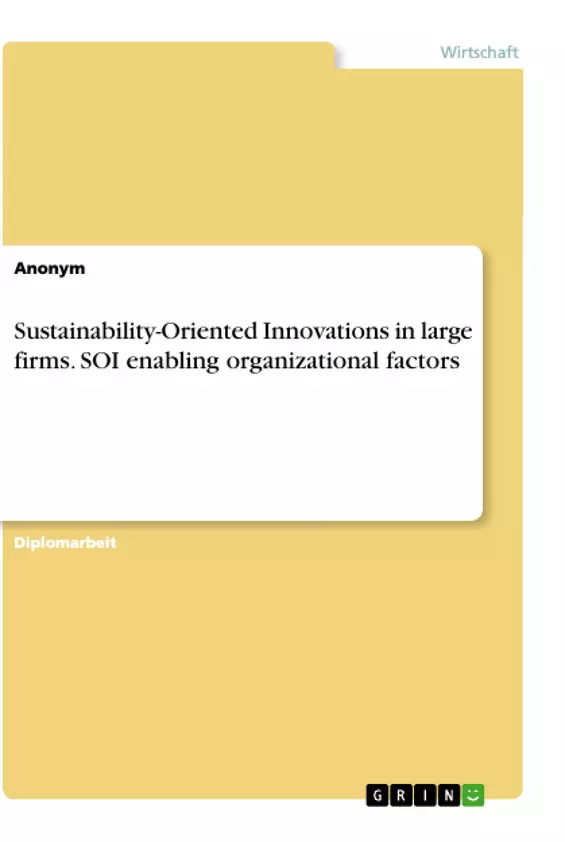This research seeks to gain insights into the enabling organizational factors of SOI in large firms by answering the following research question: How do large firms enable sustainability-oriented innovation? In this way the broad research question reflects the exploratory character of this study and provides the researcher with the opportunity to narrow the focus on specific organizational factors during the course of the data analysis. The thesis seeks to address the research question by first reviewing the literature in the field of sustainability and innovation. Thereafter, the methodology and choice of the qualitative research design is discussed. Further, the part also elaborates on the selection of the case companies. The next part represents the empirical findings and is followed by a discussion of the results. Concluding this thesis, the key findings will be re-viewed, limitations of the research design discussed, and research and managerial implications highlighted.
Over the last decade, there has been a growing interest in sustainability-oriented innovations by both academia and practice as a way to address mounting concerns about environmental degradation, social inequity, and over-consumption of earth’s resources. By conducting a multiple case study, this thesis contributes to the still emerging field by examining sustainability-oriented innovation and its enabling organizational factors in the context of large firms. The empirical results reveal an organizational focus on sustainability, which is characterized by strong market-orientation which is supported by a variety of tools and collaborative innovation partnerships. Moreover, the cases highlight a comprehensive integration of the UN sustainable development goals in several enabling factors of sustainability-oriented innovations.
Inhaltsverzeichnis
- 1 Introduction.
- 1.1 Research Question and Structure of the Thesis.
- 2 Theoretical Foundations........
- 2.1 Sustainable development..
- 2.2 Corporate sustainability.
- 2.3 Sustainability-oriented innovation..
- 2.3.1 Definition of Sustainability-oriented innovation..
- 2.3.2 Sustainability-Oriented vs. ‘Conventional' Innovation
- 2.3.3 Contexts of Sustainability Oriented Innovation.
- 2.4 Enabling Factors of SOI
- 2.4.1 Corporate culture.
- 2.4.2 Organizational focus - Vision, strategy & managerial commitment.
- 2.4.3 External collaborations for SOI
- 2.4.4 Knowledge management and Inter-functional Collaboration
- 2.4.5 Tools and methodologies for SOI
- 3 Methodology.
- 3.1 Research Approach.......
- 3.2 Case selections
- 3.3 Data Collection and Analysis.
- 3.4 Validity & Reliability.
- 4 Empirical Findings….........
- 4.1 Case company profiles and strategic approaches to sustainability.
- 4.2 Organizational focus..
- 4.2.1 Sustainability as integral part of corporate strategy.
- 4.2.2 Sustainability targets.
- 4.2.3 Focus on the SDGs and Collaboration for SOI.
- 4.3 External collaborations for SOI..
- 4.3.1 Social investment programs - Autodesk and Cisco.
- 4.3.1 Open innovation platforms – Enel and Novozymes....
- 4.4 Knowledge management and Inter-functional Collaboration
- 4.5 Tools and methodologies for SOI processes.
- 4.5.1 Neste's handprint methodology
- 4.5.2 Enel's CirculAbility Model..
- 4.5.3 Assessing impact on the SDGs – Chr. Hansen and Novozymes...
- 5 Discussion and Outlook
- 5.1 Discussion of Results
- 5.1.1 Organizational focus - Sustainability at the core
- 5.1.2 Tools and methodologies for SOI processes.
- 5.1.3 External collaborations for SOI
- 5.1.4 Prevalence of the SDGs
- 5.2 Theoretical Contributions..
- 5.3 Managerial Implications ......
- 5.4 Limitations and Future Research..
Zielsetzung und Themenschwerpunkte
Die vorliegende Arbeit untersucht nachhaltigkeitsorientierte Innovationen in großen Unternehmen und trägt damit zum wachsenden Forschungsfeld der Nachhaltigkeitsinnovation bei. Sie analysiert, wie Unternehmen Nachhaltigkeit in ihre Innovationsstrategien integrieren und welche organisatorischen Faktoren dabei eine Rolle spielen. Die Arbeit zeichnet sich durch eine multiple Fallstudie aus, die auf empirischen Daten basiert.
- Integration von Nachhaltigkeitsaspekten in Unternehmensstrategien
- Bedeutung von externen Kooperationen für Nachhaltigkeitsinnovationen
- Rolle von Werkzeugen und Methoden für die Implementierung von Nachhaltigkeitsinnovationen
- Bedeutung der UN-Nachhaltigkeitsziele (SDGs) für Nachhaltigkeitsinnovationen
- Entwicklung eines tieferen Verständnisses der organisatorischen Faktoren, die Nachhaltigkeitsinnovationen in großen Unternehmen ermöglichen
Zusammenfassung der Kapitel
- Kapitel 1: Einführung. Das Kapitel legt den Rahmen für die Arbeit fest, definiert die Forschungsfrage und erläutert die Struktur der Thesis.
- Kapitel 2: Theoretische Grundlagen. Dieses Kapitel stellt die relevanten theoretischen Konzepte vor, die die Grundlage für die Untersuchung bilden. Dazu gehören die Definition von nachhaltigkeitsorientierter Innovation, die Rolle der Unternehmensstrategie und die Bedeutung externer Kooperationen.
- Kapitel 3: Methodik. Dieses Kapitel erläutert den methodischen Ansatz der Arbeit, die Fallstudienauswahl, die Datenerhebung und -analyse sowie die Validität und Reliabilität der Ergebnisse.
- Kapitel 4: Empirische Ergebnisse. Dieses Kapitel präsentiert die Ergebnisse der Fallstudien, die den Fokus auf die Analyse der Fallunternehmensprofile, der Integrationsstrategie von Nachhaltigkeit in die Unternehmensstrategie, der Bedeutung externer Kooperationen und der Rolle von Werkzeugen und Methoden für Nachhaltigkeitsinnovationen legen.
Schlüsselwörter
Die Arbeit konzentriert sich auf die Themen Nachhaltigkeit, Innovation, Unternehmen, Fallstudien, Nachhaltigkeitsziele (SDGs), externe Kooperationen, Werkzeuge und Methoden, Organisationskultur, strategisches Management.
Häufig gestellte Fragen
Was sind nachhaltigkeitsorientierte Innovationen (SOI)?
SOI sind Neuerungen bei Produkten, Dienstleistungen oder Prozessen, die nicht nur ökonomischen Erfolg anstreben, sondern gezielt ökologische und soziale Vorteile generieren.
Wie integrieren große Unternehmen Nachhaltigkeit in ihre Innovation?
Große Firmen verankern Nachhaltigkeit oft direkt in ihrer Unternehmensstrategie und nutzen die UN-Nachhaltigkeitsziele (SDGs) als Kompass für ihre Forschungs- und Entwicklungsprojekte.
Welche Rolle spielen externe Kooperationen für SOI?
Da Nachhaltigkeitsfragen komplex sind, arbeiten Unternehmen oft mit Partnern, NGOs oder über Open-Innovation-Plattformen zusammen, um notwendiges Wissen und Ressourcen zu bündeln.
Welche Werkzeuge helfen bei der Umsetzung von Nachhaltigkeitsinnovationen?
Methoden wie Nestes "Handprint-Methodik" oder Enels "CirculAbility Model" helfen Unternehmen, den positiven Einfluss ihrer Produkte auf Umwelt und Gesellschaft messbar zu machen.
Welche organisatorischen Faktoren begünstigen SOI?
Entscheidend sind eine starke Marktorientierung, das Engagement des Managements, eine offene Unternehmenskultur sowie ein effektives Wissensmanagement zwischen verschiedenen Abteilungen.
- Citar trabajo
- Anonym (Autor), 2020, Sustainability-Oriented Innovations in large firms. SOI enabling organizational factors, Múnich, GRIN Verlag, https://www.grin.com/document/994862



